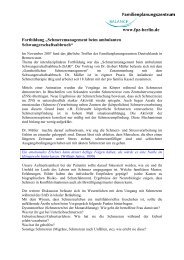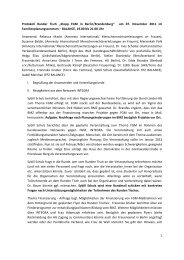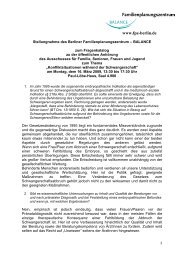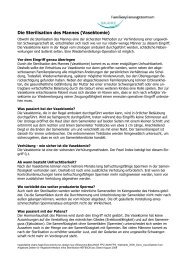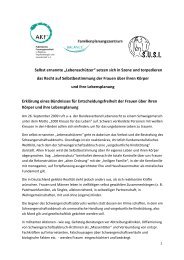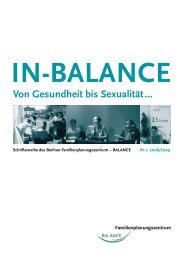Listening to African Voices - FPZ
Listening to African Voices - FPZ
Listening to African Voices - FPZ
Create successful ePaper yourself
Turn your PDF publications into a flip-book with our unique Google optimized e-Paper software.
participants who did not want <strong>to</strong> answer represented2%-10% of the interviewed sample:• Item assessing the participant’s age – numberof refusals: 173 (9.8% of the sample);• Item assessing the region of origin – numberof refusals: 43 (2.4% of the sample);• Item assessing the ethnic group affiliation– number of refusals: 45 (2.5% of thesample);• Item on the participant’s status regardingthe residence permit – number of refusals:174 (9.9% of the sample);• Item on the district of Hamburg where theparticipant lives – Number of refusals: 119(6.7% of the sample);• Item on the participant’s duration of stay inGermany – number of refusals: 2.4 (43% ofthe sample);• Item on the participant’s place of birth– number of refusals: 113 (6.4% of thesample);The researchers also repeatedly noted doubtson the data provided for the items mentionedin the list above. Thus, the validity of somesocio-demographic outcomes is uncertain.The average age of the interview participantswas 36 years. Over 88% of the interviewedparticipants fell in the age range from 15-44years. Women reported a significantly loweraverage age than men. The average durationof stay in Germany was between 10 and 11years (see table 7).Socio-demographicvariablesAge (in years)Over 40% of the participants were marriedat the time of the interview. The largemajority reported that they were marriedmonogamously, however, almost 3% of theinterviewees, 15 women and 34 men reportedthat they lived in a polygamous union.Out of the 15 women, four were married <strong>to</strong>an <strong>African</strong> man who had a European co-wife. The remainingnine women were married <strong>to</strong> <strong>African</strong> men who had morethan one <strong>African</strong> spouse. Out of the 34 polygamous men, 14were married <strong>to</strong> a European woman and had one or more<strong>African</strong> partners at the same time. The remaining 13 menwere polygamously married <strong>to</strong> at least two <strong>African</strong> women.Another 15% of both men and women reported that theywere divorced or widowed.Table 7: Socio-demographic characteristics of the interviewed samplewomen(n = 685)men(n = 1082)<strong>to</strong>tal sample(n = 1767)Mean (standard deviation) 34.7 (9.3) 36.8 (9.3) 36.0 (9.3)Range 16-75 15-82 15-83Average education level (in years)Mean (standard deviation) 11.91 (4.9) 12.81 (5.1) 12.5 (5.0)Range 0-27 0-27 0-27ReligionMuslim 183 (27.0%) 491 (45.9%) 674 (38.6%)Christian 475 (70.1%) 539 (50.4%) 1014 (58.0%)Traditional religion 4 (0.6%) 9 (0.8%) 13 (0.7%)None believers 16 (2.4%) 30 (2.8%) 46 (2.6%)Social statusMarried (monogamous) 314 (46.7%) 400 (37.3%) 714 (40.3%)Married (polygamous) 15 (2.2%) 34 (3.2%%) 49 (2.8%)Separated/divorced/widowed 96 (14.3%) 165 (15.4%) 261 (14.7)Never been married 22 248 (36.8%) 473 (44.1%) 721 (40.7%)Average <strong>to</strong>tal number of childrenGirls (range) 0.69 (0-6) 0.65 (0-7) 0.67 (0-7)Boys (range) 0.79 (0-4) 0.68 (0-4) 0.72 (0-4)Average number of children living in GermanyAverage girls (range) 0.55 (0-6) 0.45 (0-6) 0.49 (0-6)Average boys (range) 0.65 (0-4) 0.44 (0-4) 0.53 (0-4)Migrated from a(n)Urban area 495 (72.1%) 787 (72.4%) 1282 (72.3%)Rural area 145 (22.1%) 249 (22.9%) 394 (22.2%)Missing data 24 (3.5%) 38 (3.7%) 62 (3.5%)Does not want <strong>to</strong> answer 23 (2.3%) 11 (1.0%) 34 (2.0%)Time spent in Germany (in months)Mean (standard deviation) 129.0 (92.5) 127.03 127.8 (89.1)Range 1-552 0-576 0-576About 56% of the women and 45 % of the men had atleast one child in Germany which indicates that the childrenof men are more likely <strong>to</strong> remain in Africa than those ofwomen. The birth rate among immigrants is significantlylower than in their countries of origin: the women participantsreported on average 1.5 children and men 1.3 children(compare for example with NCP Nigeria and ICF Macro2009).Almost two thirds of the participants had children, but barelyhalf of them had their children living with them in Germany.22 Including participants living in a relationship without being married<strong>Listening</strong> <strong>to</strong> <strong>African</strong> <strong>Voices</strong> 31






